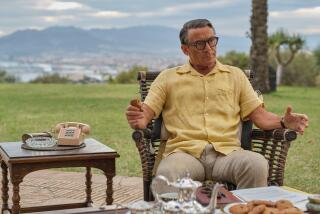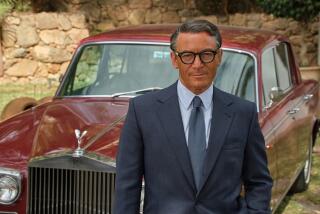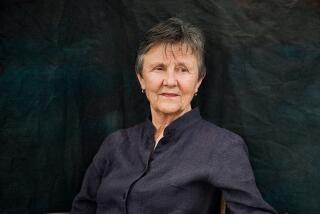More than meets the eye
There is much to be said about Cary Grant, and just about all of it, proven or not, can be found in Marc Eliot’s new biography, “Cary Grant.” Eliot, who takes as a given the rumors circulating during Grant’s life and even more so after his death that he was either homosexual or bisexual, writes that he aims to offer “a clearer window” into Hollywood’s reaction to gays “in Grant’s lifetime.” Alas, judging by the dearth of sources in the text and end notes (some of which are inaccurate), the book is too often speculative rather than informative.
More is the pity, because Eliot tells a pretty good story when he sticks to what went into the making of Grant’s films and limns Archibald Leach, born in Bristol, England, in 1904. His father was a ne’er-do-well and a philanderer. His mother was institutionalized with a nervous breakdown when he was 10; the boy was told she had died, and he would not find out the truth until he was 30. Look no further for his problems with abandonment and trust.
But the youngster had pluck. At 14, he joined a troupe of acrobatic slapstick comedians, developed balance and timing and went to New York with the troupe at 16. During the next 20 years, “Archie” evolved from stilt walker to male escort to Broadway stage actor to best-looking movie actor in a tuxedo to rising star who refused to be enslaved by the studio system into, finally, that handsome apotheosis of urbanity and quick wit, Cary Grant.
Hailed by film historian David Thomson as “the best and most important actor in the history of the cinema,” Grant made 72 pictures between 1932 and 1966. Even now, 18 years after his death and 38 years since his last film, Grant remains (at least for people of a certain age) a figure women would kill to be romanced by and men would die to be.
“Everybody wants to be Cary Grant,” he once said of that dazzling fellow. “Even I want to be Cary Grant.”
Time magazine called him “the world’s most perfect male animal.” In his performances he is by turns alluring, confident, bashful, romantic, comic in word and action, heroic and in sum, everything a man could hope to be but no mortal could achieve. He always gets the girl, or rather, she always gets him. One of the givens of Grant’s characters is that women pursued him.
Eliot, as others have before him, makes much of the fact that Grant shared a house with actor Randolph Scott for many years and takes for granted that they were lovers without any firsthand corroboration. Maybe they were; obviously they had a deep friendship. But you’d think if it were so that after all these years someone who was there would have come forward with credible rather than anonymous details.
The book’s bedevilment is in the details, or lack of them. In life, as a result of mutual pursuit, he was married five times: to Virginia Cherrill, the Blind Girl in Charlie Chaplin’s “City Lights” (Eliot had access to her diaries and one wishes he had quoted from them instead of summarizing them); to Woolworth heiress Barbara Hutton (they were called “Cash and Cary”); and to actresses Betsy Drake and Dyan Cannon. (Cannon is the mother of Grant’s only child, Jennifer.) The final marriage took, to publicist Barbara Harris, whom he began dating in 1978, married in 1981 and lived happily with until he died in 1986 at 82.
“Every one of my wives left me. I don’t know why. Maybe they got bored, tired of me,” Grant says in a quote Eliot attributes to a 1971 New York Times story. Except the Times didn’t run a profile on Grant in 1971; those lines appeared in 1977, a simple editing mistake, perhaps. But what Eliot includes as the end of the quote -- “My first wife accused me of being a homosexual. All the women except Betsy have accused me of being a homosexual. Virginia was just the first.” -- isn’t in that story or in the Times’ archives, according to the paper’s chief of research, and it prompts uncertainty about other references.
There are far more interesting -- and documentable -- aspects to Grant’s life and work. He was, sometimes at personal risk or cost, an outspoken friend in tough times to Chaplin, Ingrid Bergman, Marilyn Monroe and Rex Harrison. Eliot devotes about a page in all to this. He tells us that “Grant was one of the better script-doctors in Hollywood, able to analyze characters as well as the personal style of any producer or director he had ever worked with,” but he doesn’t elaborate.
Grant is still so popular that many of his best films are regular TV fare, and they showcase his facility in a wide variety of genres -- the lightning-fast comedy (“His Girl Friday” with Rosalind Russell); the satire (“The Philadelphia Story” with Katharine Hepburn); the weeper (“An Affair to Remember” with Deborah Kerr, and the basis for “Sleepless in Seattle”); the mystery (“Charade” with Audrey Hepburn); and the spectacular trio of romantic thrillers (“Notorious” with Ingrid Bergman, “To Catch a Thief” with Grace Kelly and “North by Northwest” with Eva Marie Saint) by his favorite director, Alfred Hitchcock.
In the last two and in Howard Hawks’ screwball comedy “Bringing Up Baby” (again with Katharine Hepburn), Grant’s acrobatic training is evident in the way he grabs a damsel in distress just as she is about to plummet from a great height and pulls her to safety.
Cary Grant was inimitable. Archie Leach was human. One was an icon created by screenwriters, directors and a marvelous actor. The other was a man subject to the same quirks, admirable qualities and personal failings as any of us have. But Eliot hasn’t quite captured either one. A satisfyingly complete biography has yet to be written. *
More to Read
Sign up for our Book Club newsletter
Get the latest news, events and more from the Los Angeles Times Book Club, and help us get L.A. reading and talking.
You may occasionally receive promotional content from the Los Angeles Times.






